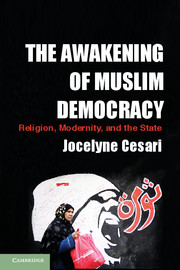Book contents
- Frontmatter
- Contents
- Acknowledgments
- Preface
- Part I THE MAKING OF ISLAM AS A MODERN RELIGION
- Part II ISLAMISM AS THE PREEMINENT POLITICAL FORCE PRE– AND POST–ARAB SPRING
- Part III THE DISJUNCTION OF DEMOCRACY AND SECULARISM – LESSONS LEARNED FROM THE ARAB SPRING
- 10 The Rise of Unsecular Democracies: The Conundrum of Religious Freedom in Muslim Democracies
- 11 The Way Forward: The Role of Islam in Democratization
- General Conclusion The Tragedy of Modernity
- Appendix I Religious Violence Index
- Appendix II Egyptian Constitution, Ratified on December 26, 2012. Suspended on July 3, 2013
- Bibliography
- Index
General Conclusion - The Tragedy of Modernity
Published online by Cambridge University Press: 05 July 2014
- Frontmatter
- Contents
- Acknowledgments
- Preface
- Part I THE MAKING OF ISLAM AS A MODERN RELIGION
- Part II ISLAMISM AS THE PREEMINENT POLITICAL FORCE PRE– AND POST–ARAB SPRING
- Part III THE DISJUNCTION OF DEMOCRACY AND SECULARISM – LESSONS LEARNED FROM THE ARAB SPRING
- 10 The Rise of Unsecular Democracies: The Conundrum of Religious Freedom in Muslim Democracies
- 11 The Way Forward: The Role of Islam in Democratization
- General Conclusion The Tragedy of Modernity
- Appendix I Religious Violence Index
- Appendix II Egyptian Constitution, Ratified on December 26, 2012. Suspended on July 3, 2013
- Bibliography
- Index
Summary
The making of Muslim-majority countries into nation-states has also been the making of Islam into a modern religion. This means that political and cultural actors adopted, pruned, and grafted Western concepts (the nation-state and secularism) to make them acceptable within their respective cultural contexts. However, instead of purging religion from both political power and public space, the outcome was quite the opposite: the embedding of Islam within the state apparatus.
Contradicting most modernization theories, the exportation of the Western political project to the new Muslim nations led to a counter secularization of sorts, even in the most secularly oriented states such as Turkey, Egypt, Iraq, or Tunisia. In other words, the confessionalization of Islam led to its politicization.
Confessionalization refers to the premodern period between the Peace of Augsburg (1555) and the Thirty Years’ War (1618–49), during which European Protestant and Catholic clergy started to enforce certain rules to distinguish their specific religious identities. Importantly, during this pre-modern period, state and religion remained deeply intertwined because the churches controlled and influenced social behaviors. This confessionalization later developed into a religious domain separate from the state. However, the state ultimately took over control and punishment of improper behavior, so ultimately confessionalization of Christianity led to its depoliticization with greater interference of the state in social domains previously under the guidance of the church.
- Type
- Chapter
- Information
- The Awakening of Muslim DemocracyReligion, Modernity, and the State, pp. 275 - 280Publisher: Cambridge University PressPrint publication year: 2014



